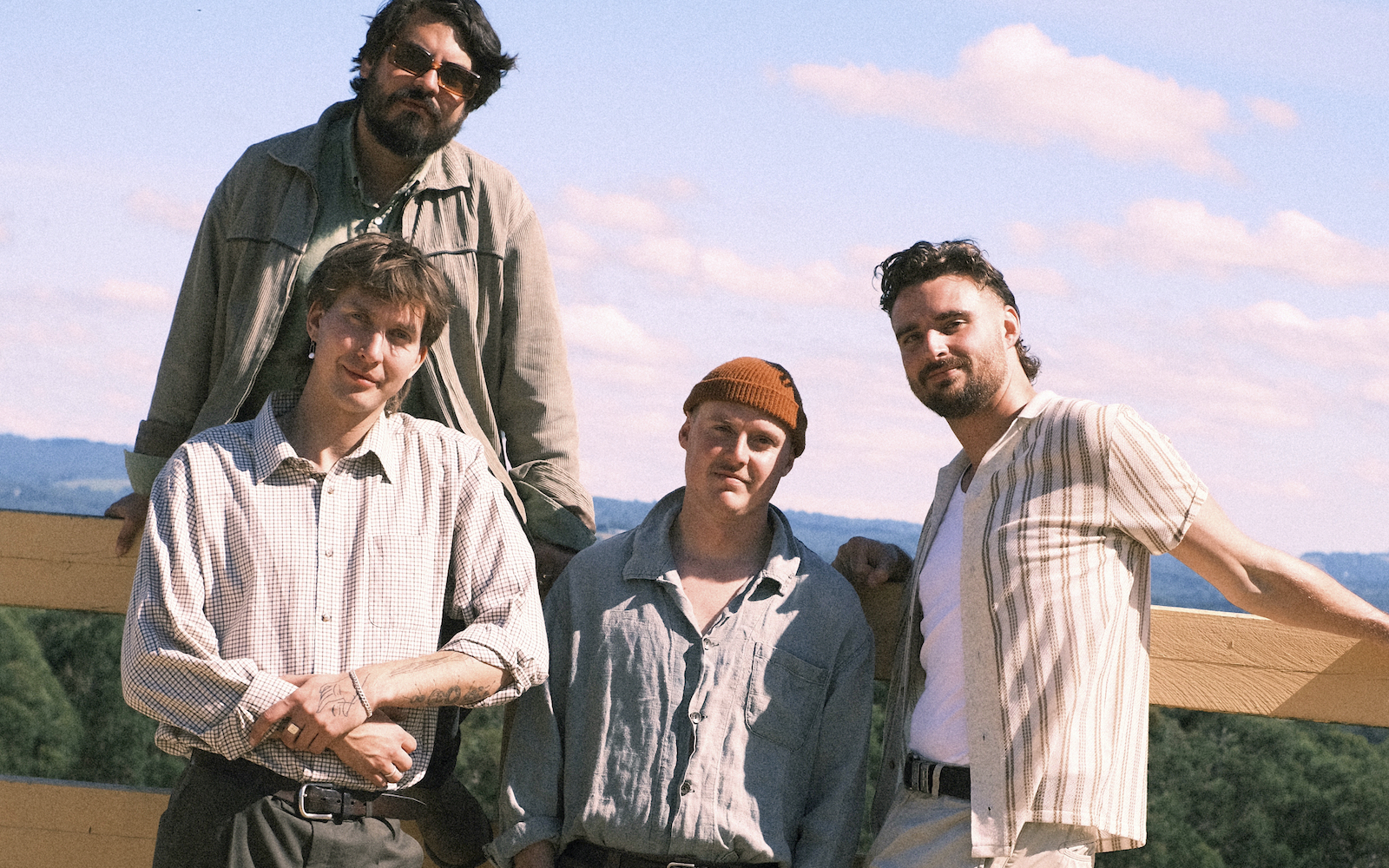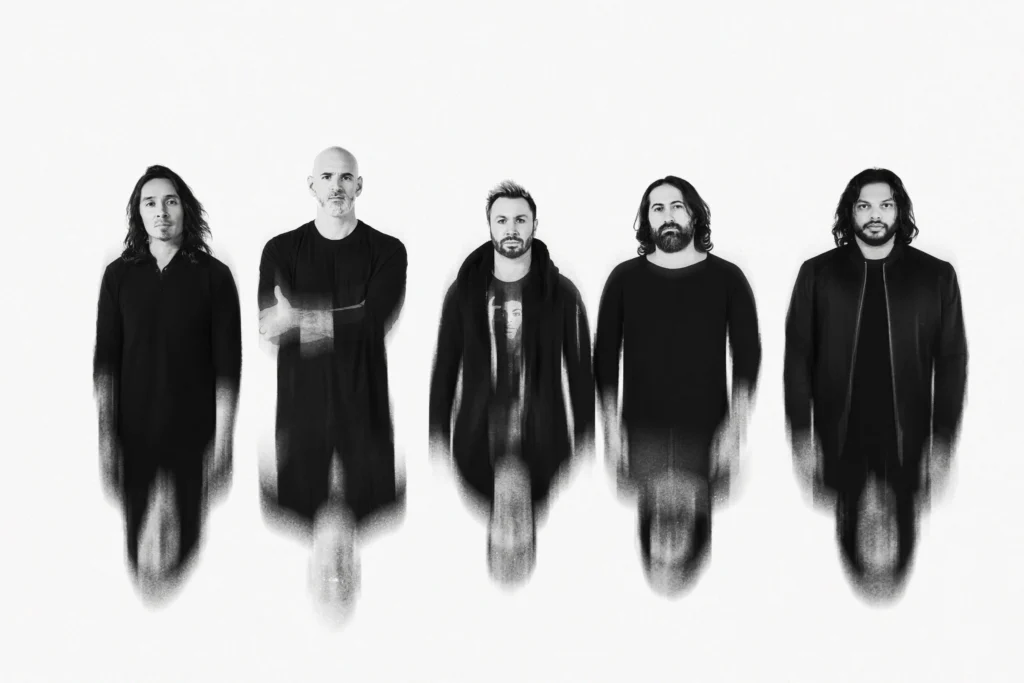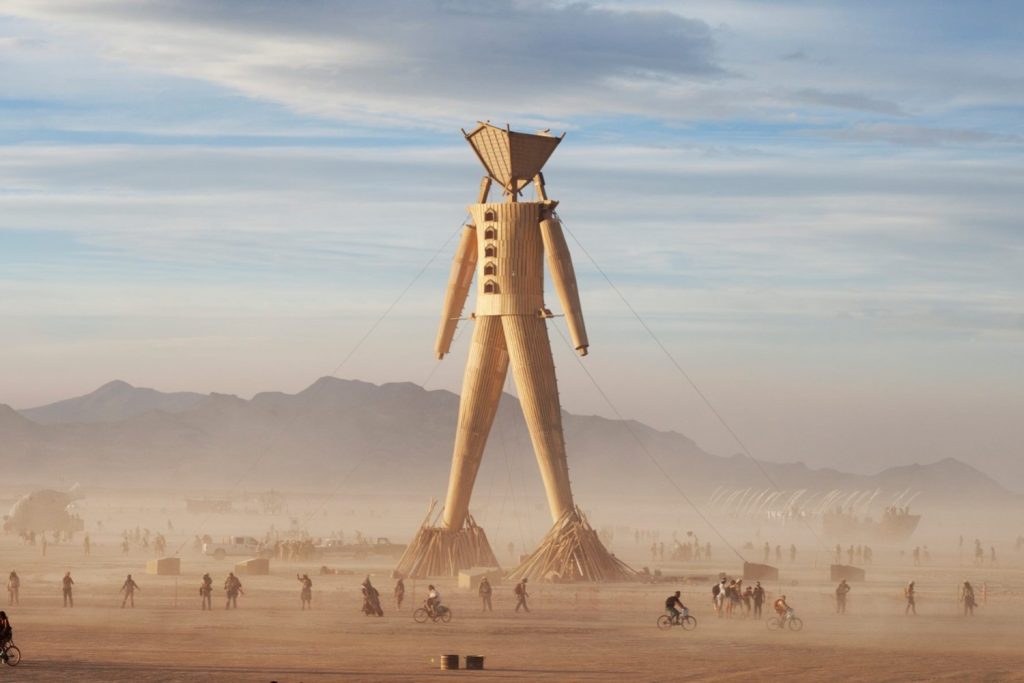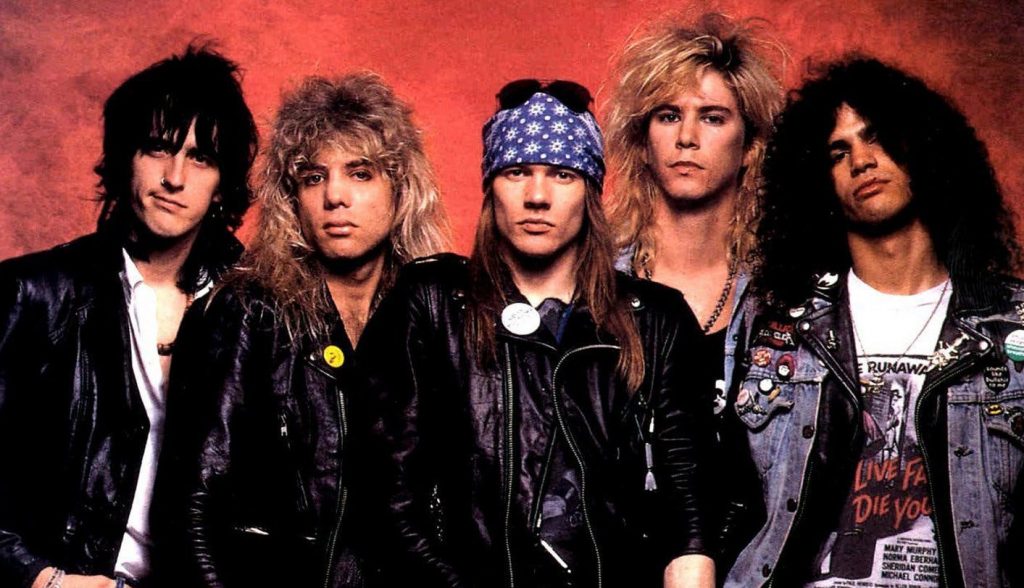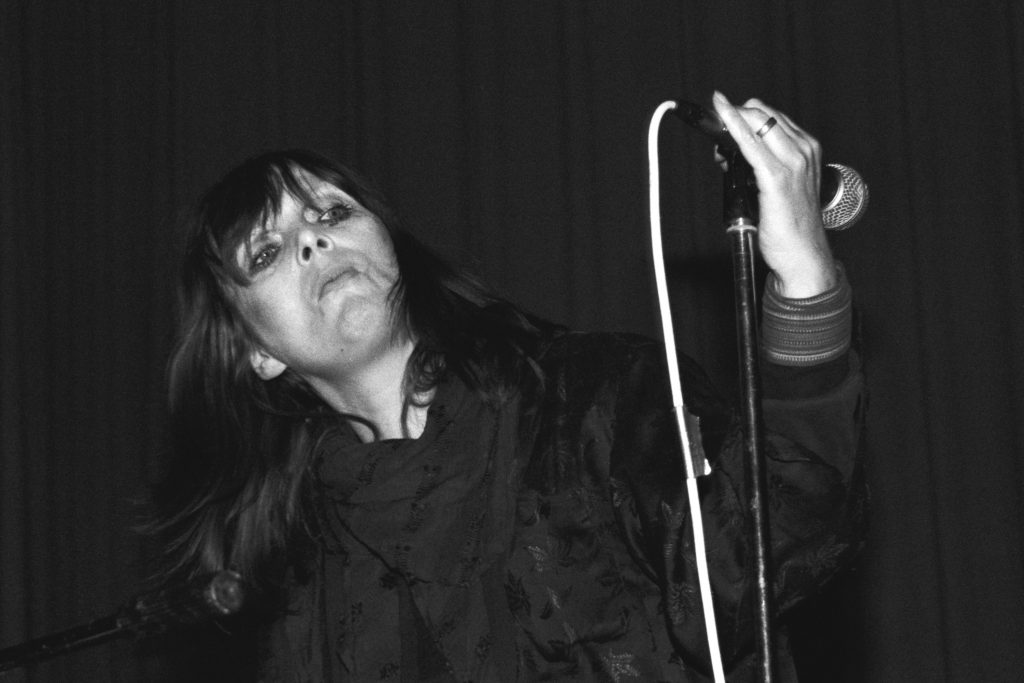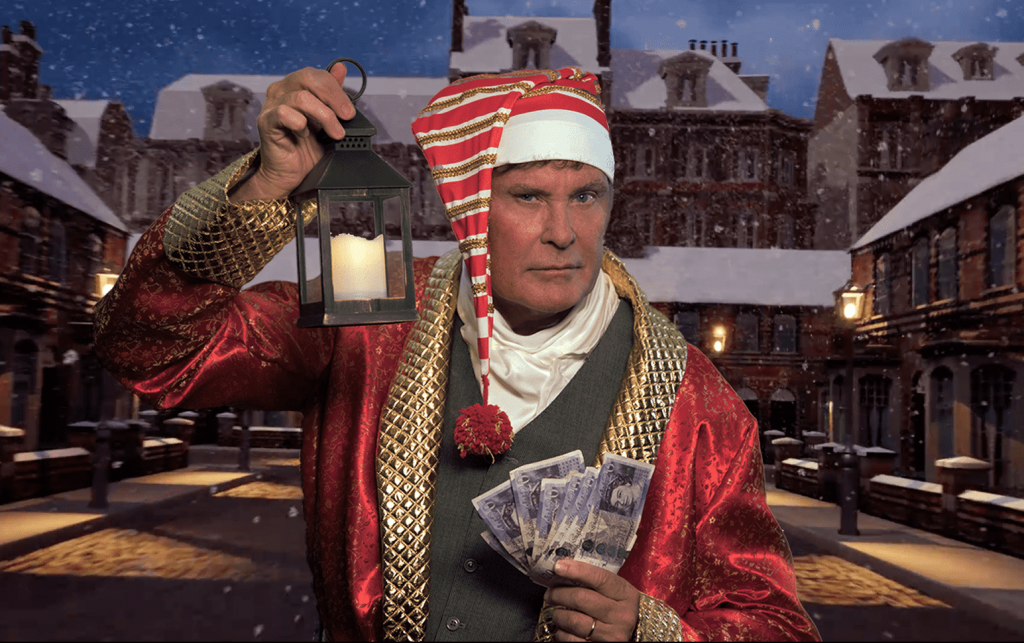Kitschen Boy was first cooked up in, you guessed it, the kitchen.
Although he was usually behind the grills flipping burgers at Hawthorn’s Nevermind Bar, on Thursday nights Dylan Baddeley would throw off the apron and strap on an acoustic guitar to play some songs for loyal punters.
Dylan’s performances would soundtrack the shifts of Ted Mitchell and Carlos Tinsey, who worked behind the bar and booked bands for Nev’s, respectively.
Keep up with the latest music news, features, festivals, interviews and reviews here.
At the time, Ted and Carl were known for their work in indie pop group DIET. which had already released popular tracks like Take Me and Danny Boy. Attracted to Dylan’s sound, Carl and Ted urged him to start a band.
Dylan listened, picking up high-school friend Nick Wood on lead guitar, Ben O’Loughlin on bass (DIET’s lead singer) and Lewis Hentschke on drums to form Kitschen Boy.
Together, the group built Dylan’s half-baked ideas into heartfelt ballads that would go on to amass over one million plays online, including Life in Lo-Fi and Charlie Don’t Party. DIET. and Kitschen Boy became staples of Nev’s monthly Couchfest, brewing a community of passionate musicians in the heart of Melbourne’s eastern suburbs.
But as the chaos of life and the difficulties of the pandemic ensued, members of both bands changed their direction. Dylan and Lewis became all that remained of the original Kitschen Boy line-up, whilst DIET.’s musical output paused.
Carl, who had helped out in shows after Ben’s departure, joined Kitschen Boy on bass. After Nick left to pursue his musical passions as a DJ, Ted slid in on lead guitar.
The cauldron of talent that grew from open mic nights and humble performances in Melbourne’s inner city had combined into one band, leaving Kitschen Boy with a fresh canvas to paint on with their brand of ‘Paddle-Pop’.
As I drink a beer alongside Dylan, Carl, and Ted at the cosy Leadbeater Hotel, (which houses the band’s recording studio), a certain feeling of security in their current line-up is clear.
“I genuinely feel like we’re so settled as this formation,” Carl says. “I just feel like it’s working really well.”
While roles in the band have shifted around a lot, Dylan remains the primary songwriter. Honing his craft since high school, Dylan lends his musicality to a lovable “kitsch” quality which formed the name of the band and continues to influence his lyricism.
“Kitsch means excessively garish or sentimental. I thought that was kind of funny because my music was always way too emotional and just kind of over the top,” Dylan says.
Often intimate and contemplative, Dylan’s lyricism, he says, is bred from spending a lot of time figuring himself out. Songwriting helps him unpack the way he deals with love, romance and friendship.
“A lot of that is analysing why I’m reacting to things in certain ways, or why I’m not being good enough for somebody,” he says as the sun begins to set, bringing the room into a bluish hue, but still sustaining its warmth.
View this post on Instagram
While the lyricism of songs like I Know It’s Not My Business But… look outward into another relationship, Dylan says he’s no longer comfortable throwing stones from glass houses.
“I guess it’s started to not feel right for me to…analyse what other people are doing and saying,” Dylan tells me. “I think I’d prefer to judge myself than others in where I’m at in my life now.”
Dylan’s earnest lyrics are soundtracked by catchy riffs that move synonymously with jangly, dreamy rhythms, adding an authentic tone to their sound similar to the work of The Cure and The Smiths. Like these bands, Kitschen Boy give fans the ability to dance while finding a sense of relatability in the melancholic sincerity of their lyricism.
“It’s almost like a choose-your-own-adventure thing,” Carl says.
“I think that awkwardness is something that is kind of fun. You can either choose to really think deeply about it, or you can choose to treat it like bubble-gum pop, where you just digest it for a bit and then move on.”
Indeed, while acknowledging it as an alternative objective, Dylan wants to shed more light on taboo topics such as mental health and relationships without making the listener feel like it always needs to be gloomy.
“I want it to be fun,” Dylan says, between sips of beer. “Especially about stuff that’s pretty hectic…putting in a sort of humorous, odd light, I think is my number one aim.”
Ted admires Dylan’s ability to give people going through similar issues an avenue to feel supported.
“I feel as if it gives people that live with the same kind of conditions a scapegoat.” Ted says. “What I like for Kitschen Boy listeners to take away from our stuff is the fact that it’s fun, considered and we’re all in it together.”
Kitschen Boy has described their sound as Paddle-Pop, blending their dreamy sounds with themes that are unequivocally reminiscent of Australian culture.
“It’s sweet, it’s enjoyable on a summer’s day, but also some of the context and some of the attitudes are quintessentially Australian to me,” Dylan says.
“A paddle pop for everyone,” Ted chimes in.
I mention when I was a kid, my memories of eating Paddle Pops centre mostly around the confusion of the rainbow flavour (Carls tells me they’re actually just caramel – who knew?) as well as the bright heat of an Aussie summer.
Kitschen Boy felt the connection of their sound with a nice climate on their first national headlining tour last year, seeing fans from Brisbane gravitate towards their art.
“Sunny weather, I think helps,” Carl says. “Our music’s a bit more compatible.”
On tour, they stayed in a warehouse known as the Concrete Surface (a name inspired by friends and fellow rockers Concrete Surfers) which hosts many of Australia’s indie bands including Dune Rats and Last Dinosaurs.
Rob, the owner of the warehouse and a local legend, allegedly only asks for a slab of XXXX in return of his hospitality, which has nurtured the growth of Brisbane’s music culture.
“It’s got this warehouse filled with 1920s Fords, a couple of little studios in there for bands rehearsing,” Dylan says. “He’s fostered their development – the entire Brisbane music scene. He’s just been pivotal.”
Dylan’s blog and YouTube channel, GO TIME!, specialises in cars and made him unsurprisingly compatible with Rob, but it has also stretched the reach of Kitschen Boy’s music to die-hard rev-heads.
“They’re very loyal to Dylan,” Carl says. “They’ve been able to match the look of the car and the experience with the music.”
@kitschen.boy We wrote a song about when we thought a guy was tryna steal Dyl’s dirtbike #guitar #song #band ♬ original sound – Kitschen Boy
“Sometimes there’ll be a full car meet up outside of a Kitschen Boy gig,” Dylan says, seeming proud his music has been able to reach a community he loves.
A testament to the palatability of their music, Kitschen Boy are cherishing the devotion of punters across Australia.
“We played a headline show in Adelaide and the enthusiasm and passion from the crowd was just ridiculous,” Carl says. “It was just the best.”
As we finish off our beers, the lads move into the studio to continue polishing their upcoming EP, Now Arriving at Panic Station. The first single, Close Friends, is set to be released on May 11.
“We’re really excited,” Carl says. “We’re doing the biggest rooms we’ve done and that’s scary, but we feel a lot of support from our team…we’re really keen to see how it goes.”
Dylan promises one thing for Kitschen Boy fans:
“There’s not another band in Australia whose frontman does bigger skids,” he says, prompting an eruption of laughter amongst us. “I will challenge them to a drift off.”
For more information on upcoming shows and new music, follow Kitschen Boy on Instagram here.
